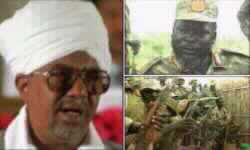HIGLIGHTS: SPLA Claims it Has Made a 'Tactical Withdrawal'||Government Says Victory Followed Two Weeks of Intensive and Fierce Fighting||IGAD Says Peace Talks Would Resume Between Khartoum and the Rebels in Kenya Oct. 14|| STORY: Sudan said Tuesday that its military regained control of a southern town whose capture by rebels last month prompted the government to suspend talks aimed at ending the 19-year civil war.
An army statement read over state-run television said government troops, police forces, paramilitary and volunteers "scored a new victory and entered the great town of Torit ... bringing it back to the homeland."
Torit is strategically important because it is on a major road leading to the city of Juba, some 1,000 miles south of Khartoum. From Torit, the rebels were in position to attack Juba, the southern headquarters for government forces in the south.
After rebels of the Sudan People's Liberation Army captured Torit on Aug. 31, the government recalled its negotiators to a second round of peace talks that were in progress in neighboring Kenya. It said it would resume talks after regaining Torit.
The Nairobi-based Intergovernmental Authority on Development, which supervises the peace talks, had said Friday talks would resume Oct. 14 and the two sides would sign an understanding to cease hostilities.
Samson Kwaje, SPLA spokesman in Nairobi, said rebel troops had made a "tactical withdrawal" from Torit to remove equipment and supplies. He said there was no fighting.
The army statement gave no casualty details but said several rebel tanks were destroyed and that the "victory followed two weeks of intensive and fierce fighting." Foreign Minister Mustafa Osman Ismail, said late Monday on Sudanese television that hundreds of rebels had died in battle.
The army statement did not speak of government casualties.
Sudanese rebels have been fighting the Khartoum government since 1983, demanding autonomy for the mostly animist and Christian south. Fighting and war-related famine have killed 2 million people and displaced an estimated 4 million.
On July 20, both sides signed a protocol that provided for the separation of state and religion in southern Sudan, and a referendum on self-determination for the south in six years. They were unable to agree on a cease-fire.
PHOTO CAPTION
Sudanese President, Omar Al-Basheer, ( R); (Top R) SPLA rebel leader, John Garang; SPLA militias.
- Author:
News Agencies - Section:
WORLD HEADLINES


 Home
Home Discover Islam
Discover Islam Quran Recitations
Quran Recitations Lectures
Lectures
 Fatwa
Fatwa Articles
Articles Fiqh
Fiqh E-Books
E-Books Boys & Girls
Boys & Girls  Hajj Rulings
Hajj Rulings Hajj Fatwas
Hajj Fatwas














